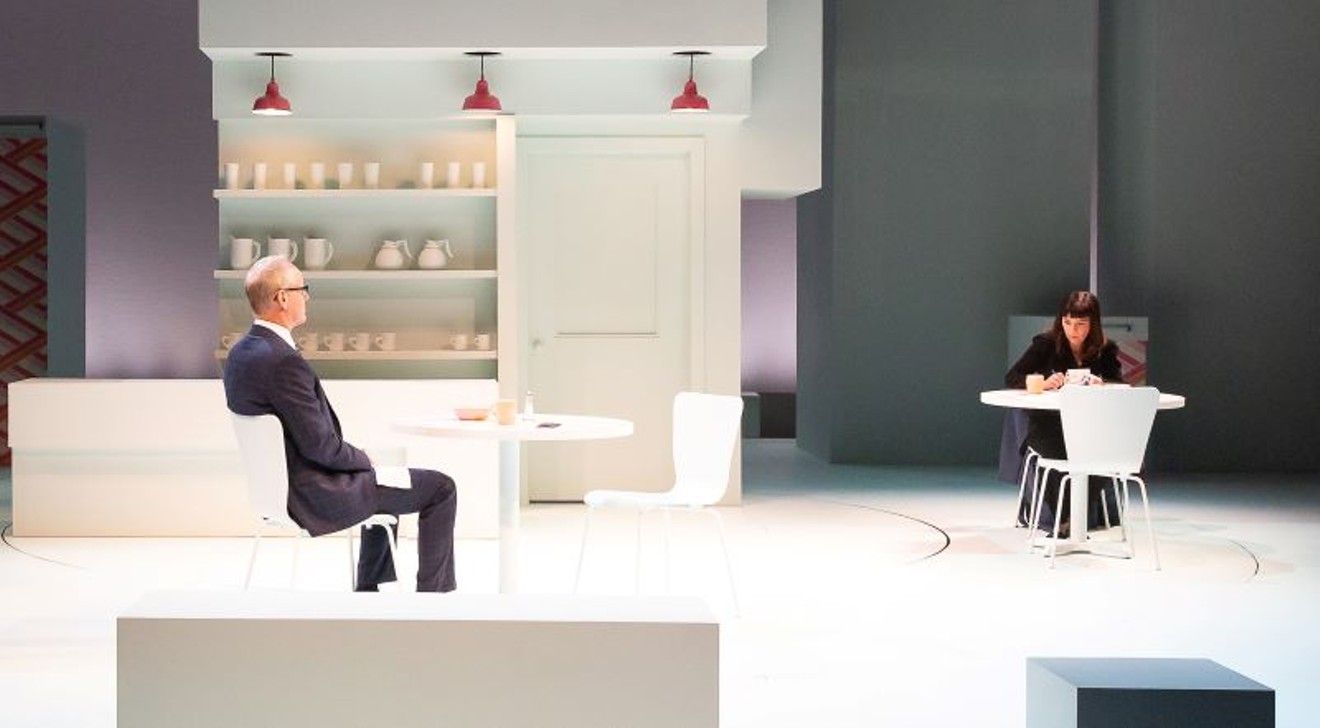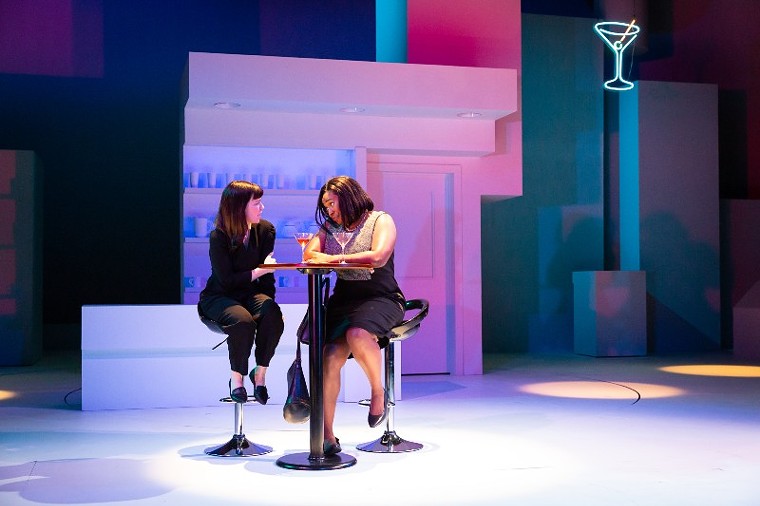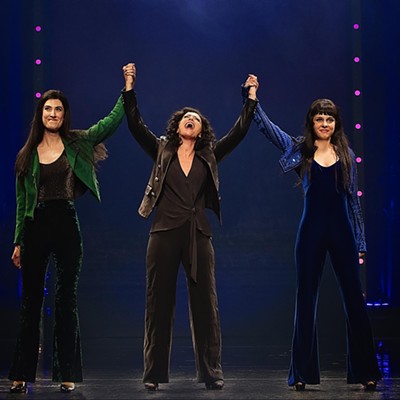I'd just die without my phone. All of us who walk around with the world in our pocket, who depend on the information, organization, and connection it affords, have thought this at some point. These machines have become not just the conduit through which we live our lives, but to some extent our lives themselves.
But what happens if you die, and your phone lives on?
This question is the top note in Sarah Ruhl’s, Dead Man’s Cellphone, now onstage at the Alley. It’s a fantastical perfume of a show (directed by Brandon Weinbrenner) whose middle and base notes dry down to something far less tech-obsessed, revealing the distinctly human desires of memory and belonging.
Jean (Elizabeth Bunch) sits in a café minding her own business when she’s distracted by the incessant ring of a cellphone from a table nearby. Upon closer attention, Jean realizes the phone belongs to a well-dressed man, sitting upright, looking straight at her. Still, he doesn't answer. Further inspection reveals the man’s name is Gordon (Chris Hutchison) and he’s quite dead.
“When the phone rings we must answer it,” Jean will say several times during the show. Odd for a woman who’s resisted getting a phone herself, wanting to avoid “being there” all the time. Preferring silence to the uncloaking of privacy these often-overheard public conversations yield.
Still, something compels her to answer. Over and over again. Promising to continue doing so until the day she dies, pledging love and loyalty to this man she's never met.
It’s not for nothing that Ruhl makes Jean an employee at the Holocaust Museum, dealing with the tragic memory of those past. Unlike work, here Jean gets to deliver sad news firsthand, and, through bending of the truth and clever confabulation, create meaningful memories for those mourning.
Or, to put it more bluntly, Jean lies. Ruhl’s play may peddle in heady subjects, but comedy is the delivery method here. As such, whether receiving calls from and/or later meeting up with Gordon’s mistress (Melissa Pritchett), mother (Todd Waite), wife (Michelle Elaine), and brother (Christopher Salazar), Jean has a plan. To make it seem like Gordon’s last thoughts were loving, kind remembrances of each person she encounters.
Give ‘em what they want to hear and make them feel good in the process. Even if it’s morally questionable. It’s an important ethical quandary that Ruhl throws back at us once she reveals what it is Gordon did for a living and how little he thought of anyone but himself.
Does a bad man deserve to be remembered well? Does his family, knowing what he did, deserve to feel loved by him? Jean becomes so obsessed with tending Gordon’s memory, and the connection she reaps thanks to controlling his phone, the lines between what she wants and how she goes about it blur with the nefarious methods employed by Gordon in his profession.
The truth is, there isn’t much plot here to work with. Most of what Ruhl gives us is scenario, situation, or send-up. Which is a difficult thing to translate elegantly for the Alley audience, more familiar with straightforward storytelling.
Wisely, it’s director Weinbrenner at the helm, no stranger to making comedy with a tinge of the serious work for the company. In his efforts with Stephen Karam’s, The Humans, in the 2019 season, Weinbrenner tap-danced dread and disillusion into the show’s comedy ballroom. Here he sweetly marries old school yuks with Ruhl’s more surreal type of humor to keep things universally palatable.
Exhausted as some of us may be at seeing Todd Waite in drag playing broad to the rafters, there’s no question audiences love it. Clad in multiple monochrome jewel-toned silk and crepe ensembles, Waite sashays about with Ruhl’s caustic lines and just enough sass to keep folks laughing…that is if they’re eager for that brand of humor.
But it’s the rest of the cast that truly does the work justice, leaning more dexterously into the surreal circumstances Ruhl places them in. Two performances in particular straddle the sweet spot of humor and the pithy honeypot of smartly stinging observations Ruhl imparts.
Can we all just agree that Chris Hutchinson is at his most divine when playing horrible men? It’s no spoiler to say that Gordon, the dead man, gets his moment to shine in this show. Opening the second act in stand-up comedy fashion, Hutchison delivers Gordon’s flowing monologue with bullseye hilarious asshole-ness.
Spouting unasked for opinions on everything from how one should eat sushi (no soy sauce you heathens) to the zombie effect of mass transit (no soul can keep up with that speed) Gordon unleashes a wonderfully funny dark tirade that skewers everything in its path.
Someone please give this actor a one-man caustic show to sink his teeth into.
Less abrasive but no less comically unexpected is Michelle Elaine as Gordon’s wife, Hermia. Specifically, when drink takes hold and she confesses how she kept it hot in the bedroom with her husband all those years. It just might be the most fluidly funny drunk scene we’ve seen in a long while, with Elaine perfectly balancing the physical humor with Ruhl’s devastatingly pointed dialogue.
While not a resident actor, Elaine has featured several times this season in Alley productions, a trend that hopefully will continue.
If there’s another star turn in this show, it’s Michael Locher’s set design, as notable for what it is as for what it isn’t.
We’ve given a pass to the stagnant (and often troublesome) two-level industrial-looking set the Alley has been working with all season, a cost-saving measure after having shut down for two years. But halleluiah, that design is gone, and instead, we have a new crisp set to consider.
Locher here gives us a mostly white on white modern shape dominated set, meant to evoke everything from the café where Gordon dies to his mother’s formal dining room to an otherworldly setting.
Cold as it may be to look at first, the design grows on us as we realize its function and see it punctuated by an unfussy and serene evocation.
On what other set design could Weinbrenner choreograph a confident, but overly long, cellphone conversation umbrella dance (a nod to Ruhl’s essay writing) and have it seem like it fits right in? The blank-ish canvass allows some of the show’s more flourishy attempts to work as best they can.
As the show closes, we aren’t necessarily sure if what we’ve seen is a play or a collection of musings wrapped in a surreal storyline. Anyone familiar with Ruhl’s writing knows that can often be the case.
But we've laughed. Hopefully, we've thought. Certainly, we’ve been gifted with some excellent performances. And perhaps most interestingly, we’ve seen the Alley reach for something a little outside the norm for their main space stage.
And isn’t that worth showing up and turning off your own cell phone for?
Dead Man's Cell Phone continues through May 8 at the Alley Theatre, 615 Texas. For more information, call 713-220-5700 or visit alleytheatre.org. $28-$74.
Support Us
Houston's independent source of
local news and culture
account
- Welcome,
Insider - Login
- My Account
- My Newsletters
- Contribute
- Contact Us
- Sign out

Chris Hutchinson and Elizabeth Bunch in Dead Man's Cell Phone
Photo by Lynn Lane
[
{
"name": "Related Stories / Support Us Combo",
"component": "11591218",
"insertPoint": "4",
"requiredCountToDisplay": "4"
},{
"name": "Air - Billboard - Inline Content",
"component": "11591214",
"insertPoint": "2/3",
"requiredCountToDisplay": "7"
},{
"name": "R1 - Beta - Mobile Only",
"component": "12287027",
"insertPoint": "8",
"requiredCountToDisplay": "8"
},{
"name": "Air - MediumRectangle - Inline Content - Mobile Display Size 2",
"component": "11591215",
"insertPoint": "12",
"requiredCountToDisplay": "12"
},{
"name": "Air - MediumRectangle - Inline Content - Mobile Display Size 2",
"component": "11591215",
"insertPoint": "4th",
"startingPoint": "16",
"requiredCountToDisplay": "12"
}
]
KEEP THE HOUSTON PRESS FREE...
Since we started the Houston Press, it has been defined as the free, independent voice of Houston, and we'd like to keep it that way. With local media under siege, it's more important than ever for us to rally support behind funding our local journalism. You can help by participating in our "I Support" program, allowing us to keep offering readers access to our incisive coverage of local news, food and culture with no paywalls.
Jessica Goldman was the theater critic for CBC Radio in Calgary prior to joining the Houston Press team. Her work has also appeared in American Theatre Magazine, Globe and Mail and Alberta Views. Jessica is a member of the American Theatre Critics Association.
Contact:
Jessica Goldman
Trending Arts & Culture
- HGO's Don Giovanni Offers Sex, Deceit and a Final Reckoning All Wrapped Up in Mozart's Music
- The 10 Best And Most Controversial Hustler Magazine Covers Ever (NSFW)
- Reviews For The Easily Distracted:
Abigail
-
Sponsored Content From: [%sponsoredBy%]
[%title%]

Don't Miss Out
SIGN UP for the latest
arts & culture
news, free stuff and more!
Become a member to support the independent voice of Houston
and help keep the future of the Houston Press FREE
Use of this website constitutes acceptance of our
terms of use,
our cookies policy, and our
privacy policy
The Houston Press may earn a portion of sales from products & services purchased through links on our site from our
affiliate partners.
©2024
Houston Press, LP. All rights reserved.






